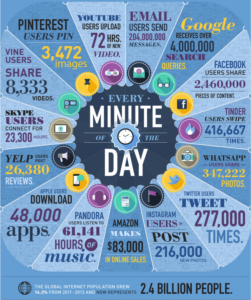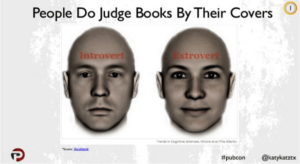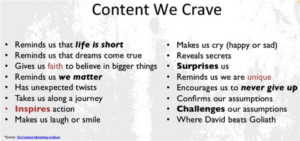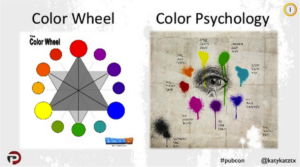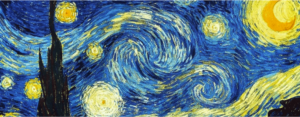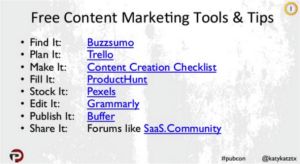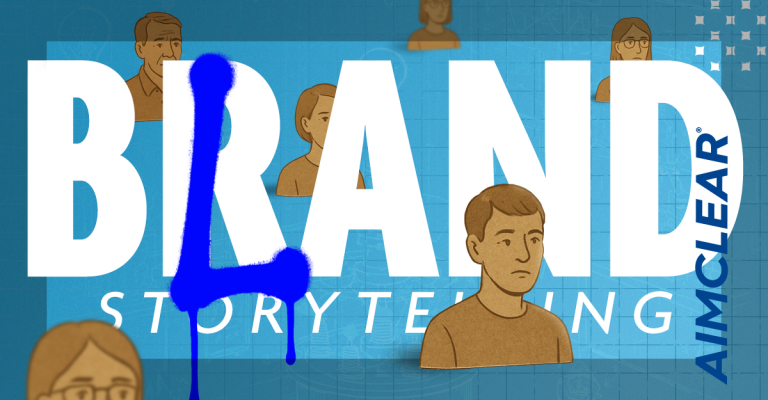The AIMCLEAR team was in Las Vegas last week for three jam-packed days of digital marketing at Pubcon. What does art history have to do with content marketing? In “Hacking Art History Will Make Your Content Stand Out,” Katy Katz, content director at Inturact, proved that marketers of today can learn a few tricks from artists of the past to accomplish business goals.
Katy started the session out by asking: Why is good content failing?
*Source: DOMO
DATA OVERLOAD! To make memorable content that performs well, marketers need to find the blend between writing for algorithms and writing for people. Most people forget 90 percent of what you share. With the attention span of online audiences shrinking and the amount of content shared online increasing, it can be difficult to stand out in the clutter. Katy defines this concept as the growing desensitization curve.
“Good” content just doesn’t cut it anymore. It has to be GREAT. In fact, 69 percent of marketers want to be better storytellers. Katy travels back in time to 10 timeless (yet powerful) hacks we can learn from artists of the past. Take a cue from history and start creating stunning content!
1. Your Customer Should Easily See Himself
Katy believes that people judge books by their covers and make assumptions about what they see. Because of this, you have to know your personas. ” inside and out. Visual tricks can make your customers feel comfortable engaging with your content.
2. Condition your Customer with Intent
Politicians are great at conditioning and aligning certain concepts with themselves. For example, one famous politician wanted voters to think of him as a family man with traditional values throughout his campaign in his promotional images.
3. Weave in a Familiar Story
Use content that is already familiar to viewers. Familiarity works because the brain is primed to pay attention to something that it recognizes. It also takes LESS time for your brain to categorize familiar information.
4. Begin Content Design with the End
Always think about your end goal when creating your content. Ask yourself what you want to accomplish and how you would define a successful campaign.
5. Have Signature Style
Brands can (and should) have a signature style. Personality should be woven into all of your communication materials. Ultra-professional is boring. Be consistent, but be yourself.
6. Appeal to human emotion.
Human emotion is very powerful. Katy provides an excellent resource for the type of content that consumers crave.
7. Bring the message to them.
Conduct outreach on websites, social media, forums and more to place your content in front of the right audience. Take control into your own hands.
8. Back to Basics: Color Theory
Color is VERY important. Eighty-five percent of shoppers say color is a primary reason for why they purchase a particular product. Each color can invoke different feelings and memories, so understanding the color wheel and psychology is critical.
8a. Be Wary of Peripheral Bias
Our brains process peripherals uniquely. Use color accents to draw your audience’s eyes around the page and direct them to key messages.
9. Be Ahead of Your Time
Similar to famous artists of the past, step outside of the box to make a statement and lead the industry.
10. Don’t Be Afraid to Take a Few Risks
Follow the 70:20:10 rule. 70% of your content should be reliable content that you know will drive leads. 20% should be more creative, such as infographics, and 10% of your content should be risky and edgy. Take chances and don’t be afraid of failure.
Finally, Katy gave us some free content marketing tools and tips. Check them out and let us know what you think! Check out her complete Pubcon slide deck to learn more about hacking art history to create amazing content.
Shutterstock Image ©: Antony McAulay

